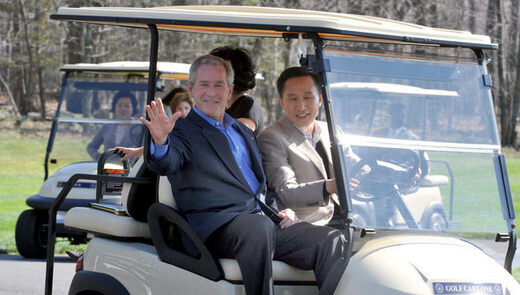hankyoreh
Links to other country sites 다른 나라 사이트 링크
[Analysis] S. Korea-U.S. summit strengthened bilateral ties, but at what cost to S. Korea?

Following two days of summit talks between South Korean President Lee Myung-bak and his U.S. counterpart George Bush, the South Korean government’s estimation is that Lee’s first talks with the U.S. leader since his inauguration in February helped to strengthen the bilateral alliance between the two countries.
Compared with five years ago, when then President Roh Moo-hyun was at odds with Bush on the North Korean nuclear issue, the weekend summit talks at Camp David were held amid a more amicable mood. During the previous Roh-Bush summit, the two struggled to find common ground on the meaning of “all options are on the table,” which Seoul feared would include the option of military action amid a worsening nuclear crisis on the Korean Peninsula. They chose a somewhat toned-down expression later, replacing the first choice with “a possible review of additional measures,” but the discord between the allies resulted in serious consequences.
Later, the differences between Seoul and Washington seemed to have come closer to resolution when the Bush administration changed its stance on the nuclear issue. However, the personal relationship between Roh and Bush or, diplomatically speaking, the trust between the two heads of state was frequently cited as an ongoing matter of concern. Roh’s predecessor, Kim Dae-jung, did not start well with Bush either, during their first encounter in 2001.
Against this backdrop, the fact that Bush invited Lee to Camp David, the presidential retreat, for summit talks can be regarded as a symbolic gesture toward getting strained relations back to normal. This might be the reason why a Seoul foreign ministry official had said that Camp David would be the key to the success of this round of summit talks.
Ironically, however, the newfound trust between the two leaders might come to be a burden to the South Korean government on many fronts in its policy-making process down the road. In other words, South Korea might have to pick up the tab for the hospitality shown to the president during his U.S. visit, and the Lee administration may find itself hard pressed to turn a deaf ear to Washington’s demands in the future. Lee’s brand of pragmatism may not score well this time around.
Though presidential spokesman Lee Dong-kwan said both nations drew a win-win result from the summit talks, Seoul is likely to see only intangible outcomes, such as the building of trust and an agreement on upgrading the strategic alliance between the two countries, while Washington chalked up more concrete gains on a variety of pending issues.
Before the summit talks, South Korea lifted its ban on U.S. beef. The concession removed a key roadblock to getting the U.S. Congress to ratify a free trade agreement signed by the nations last year, but the local farming industry in South Korea is facing tougher market conditions and there is a greater threat to food safety.
Both countries also agreed to maintain current U.S. troop levels in South Korea, enhance the current system under which the two sides share defense expenses, and improve South Korea’s status in U.S. Foreign Military Sales, which experts see as achievements for the South Korean government. However, the Lee administration could face a more pressing demand from Washington to extend the tour of duty of South Korean troops deployed to Iraq, dispatch its soldiers to Afghanistan, increase U.S. weapons purchases and pick up a greater portion of defense expenses. These are agreements that cast doubt over whether President Lee was really able to conduct his brand of “pragmatic” diplomacy during the recently-concluded summit.
Please direct questions or comments to [englishhani@hani.co.kr]
Editorial・opinion
![[Column] Season 2 of special prosecutor probe may be coming to Korea soon [Column] Season 2 of special prosecutor probe may be coming to Korea soon](https://flexible.img.hani.co.kr/flexible/normal/500/300/imgdb/original/2024/0426/3317141030699447.jpg) [Column] Season 2 of special prosecutor probe may be coming to Korea soon
[Column] Season 2 of special prosecutor probe may be coming to Korea soon![[Column] Park Geun-hye déjà vu in Yoon Suk-yeol [Column] Park Geun-hye déjà vu in Yoon Suk-yeol](https://flexible.img.hani.co.kr/flexible/normal/500/300/imgdb/original/2024/0424/651713945113788.jpg) [Column] Park Geun-hye déjà vu in Yoon Suk-yeol
[Column] Park Geun-hye déjà vu in Yoon Suk-yeol- [Editorial] New weight of N. Korea’s nuclear threats makes dialogue all the more urgent
- [Guest essay] The real reason Korea’s new right wants to dub Rhee a founding father
- [Column] ‘Choson’: Is it time we start referring to N. Korea in its own terms?
- [Editorial] Japan’s rewriting of history with Korea has gone too far
- [Column] The president’s questionable capacity for dialogue
- [Column] Are chaebol firms just pizza pies for families to divvy up as they please?
- [Column] Has Korea, too, crossed the Rubicon on China?
- [Correspondent’s column] In Japan’s alliance with US, echoes of its past alliances with UK
Most viewed articles
- 1‘We must say no’: Seoul defense chief on Korean, USFK involvement in hypothetical Taiwan crisis
- 2N. Korean delegation’s trip to Iran shows how Pyongyang is leveraging ties with Moscow
- 3‘Weddingflation’ breaks the bank for Korean couples-to-be
- 4Korea sees more deaths than births for 52nd consecutive month in February
- 5[Editorial] New weight of N. Korea’s nuclear threats makes dialogue all the more urgent
- 6[Column] Park Geun-hye déjà vu in Yoon Suk-yeol
- 7[Column] Has Korea, too, crossed the Rubicon on China?
- 8[Guest essay] The real reason Korea’s new right wants to dub Rhee a founding father
- 9Will NewJeans end up collateral damage in internal feud at K-pop juggernaut Hybe?
- 10Why Korea shouldn’t welcome Japan’s newly beefed up defense cooperation with US